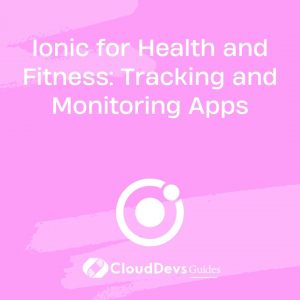Ionic for Health and Fitness: Tracking and Monitoring Apps
In today’s fast-paced world, maintaining a healthy lifestyle has become a top priority for many. Fortunately, technology has risen to the occasion, offering innovative solutions to help individuals track and monitor their health and fitness goals. One such solution is the use of Ionic framework for developing robust health and fitness tracking apps. In this blog, we will explore how Ionic is revolutionizing the health and fitness industry, delve into the code samples, and glimpse the future of personal wellness.
Table of Contents
1. Why Ionic for Health and Fitness Apps?
1.1. Cross-Platform Compatibility
One of the primary reasons Ionic has gained immense popularity in the health and fitness app development space is its cross-platform compatibility. Ionic allows developers to create a single codebase that can be deployed on multiple platforms, including iOS, Android, and the web. This cross-platform capability saves time and resources, making it an ideal choice for startups and businesses looking to reach a broad audience.
1.2. Extensive Plugin Ecosystem
Ionic boasts an extensive plugin ecosystem that simplifies the integration of essential health and fitness features. From accessing device sensors like GPS and accelerometers to integrating with wearable devices and health data repositories, Ionic’s plugin support has you covered. This wide array of plugins accelerates the development process and ensures your app can gather the necessary data for a holistic health and fitness experience.
1.3. Beautiful and Customizable UI
The Ionic framework provides a wide range of pre-designed UI components that are not only functional but also aesthetically pleasing. Developers can customize these components to match the branding and design preferences of their health and fitness apps. This ensures that your app not only delivers valuable health data but also provides an engaging and user-friendly experience.
2. Building a Basic Health and Fitness Tracking App with Ionic
Now that we’ve highlighted some of the reasons why Ionic is an excellent choice for health and fitness apps let’s dive into the code and create a basic tracking app. We’ll focus on step tracking for simplicity, but keep in mind that Ionic can handle a wide range of health data.
2.1. Prerequisites
Before we begin, make sure you have Node.js and npm installed on your system. You’ll also need the Ionic CLI. If you haven’t already installed it, you can do so with the following command:
bash npm install -g @ionic/cli
2.2. Creating a New Ionic App
Let’s start by creating a new Ionic app. Open your terminal and run the following command:
bash ionic start HealthTracker blank
This command will create a new Ionic app named “HealthTracker” based on the blank template.
2.3. Adding the Health Plugin
To access device sensors and collect health-related data, we’ll need to add a plugin. In this example, we’ll use the “cordova-plugin-health” plugin. Run the following command to add it to your project:
bash ionic cordova plugin add cordova-plugin-health npm install @ionic-native/health
2.4. Implementing Step Tracking
Now that we have the necessary plugin installed, let’s implement step tracking. We’ll create a simple interface for displaying the number of steps taken.
First, open the “src/app/home/home.page.html” file and replace its content with the following code:
html
<ion-header>
<ion-toolbar>
<ion-title>
Step Tracker
</ion-title>
</ion-toolbar>
</ion-header>
<ion-content>
<ion-card>
<ion-card-header>
Steps Taken
</ion-card-header>
<ion-card-content>
<ion-label>{{ stepCount }}</ion-label>
</ion-card-content>
</ion-card>
</ion-content>
In this code, we’ve created a basic UI with an “ion-card” element to display the step count.
Next, open the “src/app/home/home.page.ts” file and add the following code:
typescript
import { Component } from '@angular/core';
import { Health } from '@ionic-native/health/ngx';
@Component({
selector: 'app-home',
templateUrl: 'home.page.html',
styleUrls: ['home.page.scss'],
})
export class HomePage {
stepCount: number = 0;
constructor(private health: Health) {}
ionViewDidEnter() {
this.health.isAvailable().then((available) => {
if (available) {
this.health
.query({
startDate: new Date(new Date().getTime() - 7 * 24 * 60 * 60 * 1000), // Last 7 days
endDate: new Date(),
dataType: 'stepCount',
limit: 1,
})
.then((data) => {
if (data.length) {
this.stepCount = data[0].value;
}
})
.catch((error) => {
console.error('Error fetching step count:', error);
});
} else {
console.error('Health data not available on this device.');
}
});
}
}
In this TypeScript code, we’ve imported the “Health” module from the “cordova-plugin-health” plugin and created a basic logic to query the step count data. When the page loads (ionViewDidEnter), it checks if health data is available on the device, queries the step count data for the last 7 days, and updates the UI with the step count.
2.5. Testing the App
You can now run your Ionic app using the following command:
bash ionic serve
This will launch the app in your web browser. To test step tracking, you’ll need to run the app on a physical device or emulator that supports health data. Ionic allows you to easily build and deploy your app on various platforms for testing.
3. The Future of Health and Fitness Apps with Ionic
As technology continues to advance, the future of health and fitness apps built with Ionic looks promising. Here are some trends and possibilities we can anticipate:
3.1. Integration with Wearables
Wearable devices like fitness trackers and smartwatches have become increasingly popular. Ionic’s plugin ecosystem enables seamless integration with these wearables, allowing health and fitness apps to access real-time data from devices like heart rate monitors, sleep trackers, and more.
3.2. AI and Machine Learning
AI and machine learning algorithms can provide valuable insights based on health data. Ionic’s flexibility makes it suitable for integrating AI-powered features into health and fitness apps, such as personalized workout recommendations, dietary suggestions, and health risk assessments.
3.3. Telemedicine and Remote Monitoring
The COVID-19 pandemic accelerated the adoption of telemedicine and remote monitoring solutions. Ionic’s cross-platform capabilities make it an ideal choice for building apps that facilitate remote health consultations and allow healthcare providers to monitor patients’ vital signs remotely.
3.4. Gamification for Motivation
Gamification has proven to be a powerful motivator in health and fitness apps. Ionic’s UI components and animations can be leveraged to create engaging gamified experiences that encourage users to stay active and achieve their fitness goals.
Conclusion
Ionic framework has emerged as a game-changer in the development of health and fitness tracking and monitoring apps. Its cross-platform compatibility, extensive plugin ecosystem, and customizable UI components make it a top choice for developers in this space. By following the code samples provided in this blog, you can kickstart your own health and fitness app project with Ionic. As technology continues to evolve, Ionic is well-positioned to play a significant role in shaping the future of personal wellness, enabling individuals to lead healthier lives through innovative digital solutions.
Whether you’re building an app to track steps, monitor heart rate, or offer telemedicine services, Ionic provides the tools and flexibility to bring your health and fitness vision to life. So, why wait? Start coding your way to a healthier future today with Ionic!
Remember, this is just the beginning of what you can achieve with Ionic in the health and fitness space. As technology advances and new opportunities arise, Ionic will continue to empower developers to create cutting-edge solutions that enhance the well-being of individuals worldwide.
Stay tuned for more exciting developments in the world of Ionic and health and fitness apps!
Table of Contents








